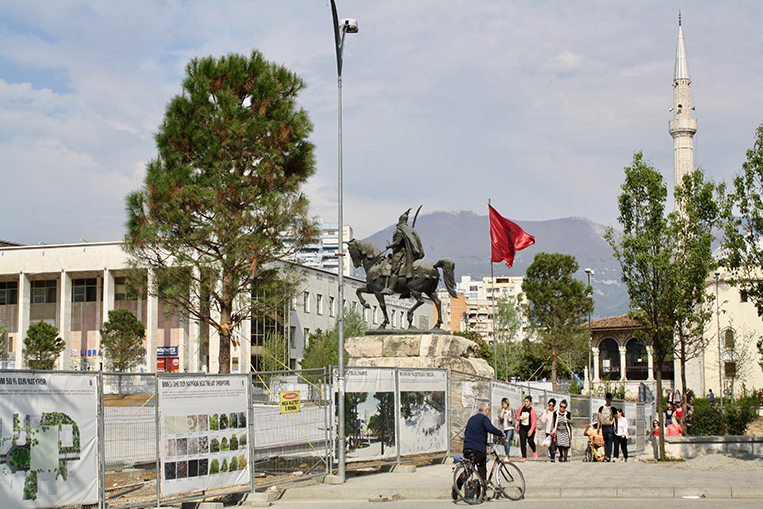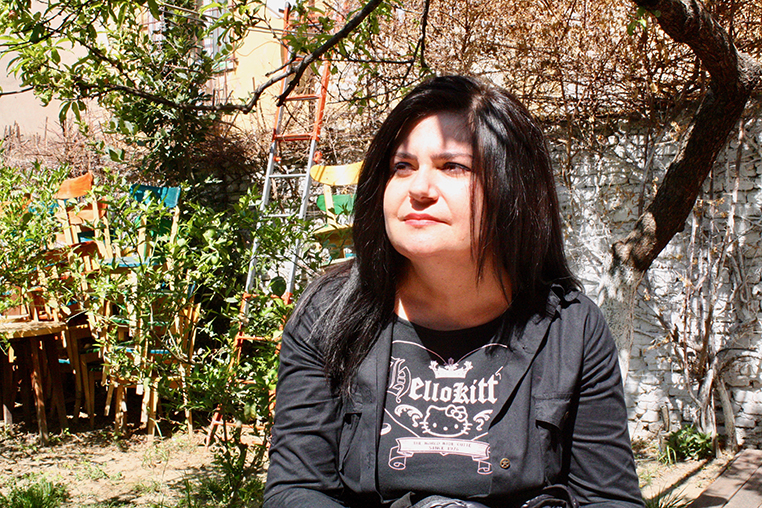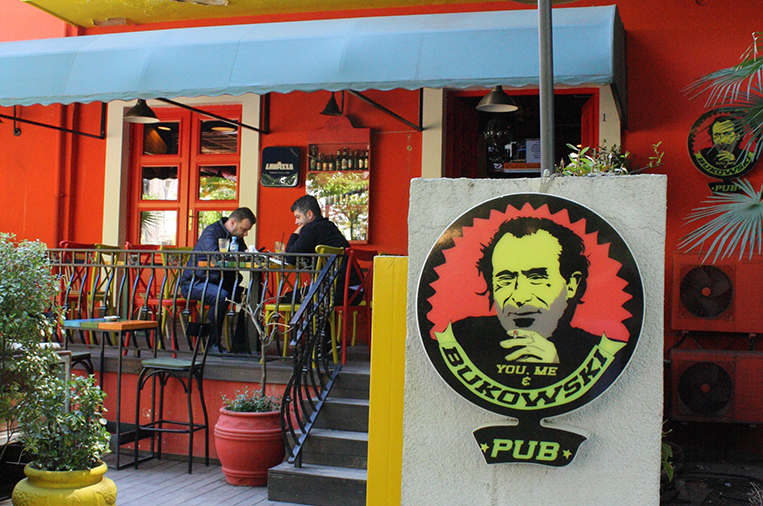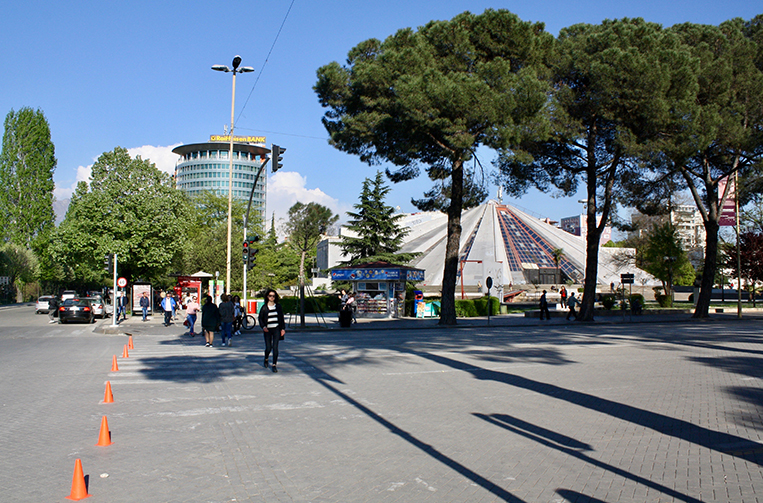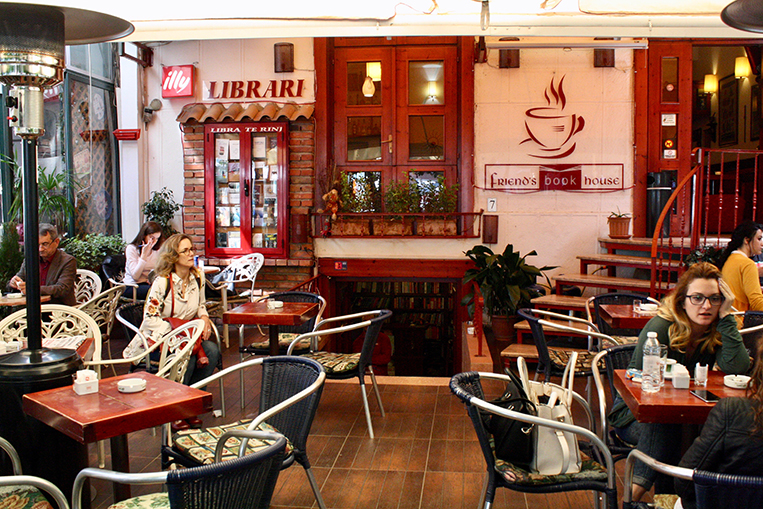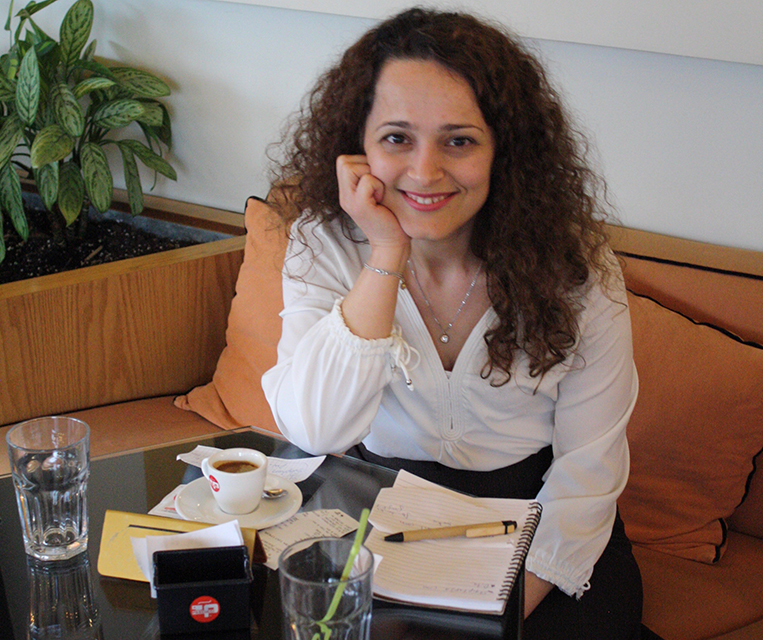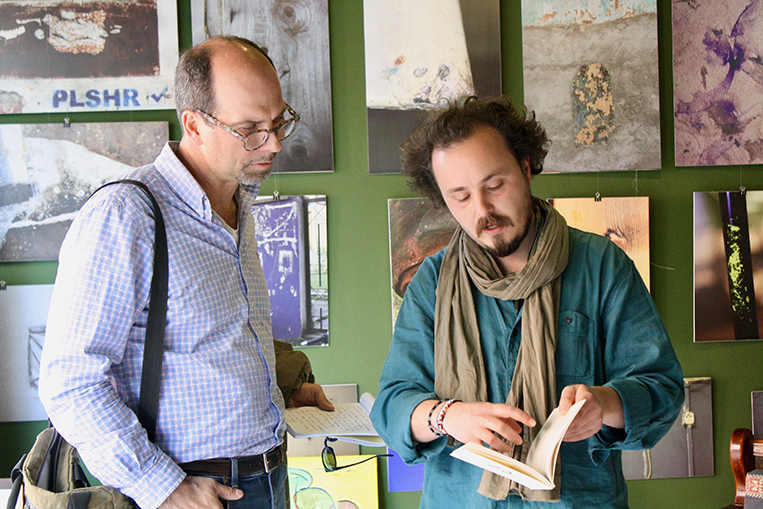The next morning, we rent a Dacia Sandero (a French-Romanian car) and plot a course to the nearest beach on the Albanian Riviera, in the south. Infrastructure improvements are evident everywhere along our six-hour journey. A raised and gleaming four-lane highway stretches before us in the port city of Durrës but terminates at a barrier a hundred kilometers later. Behind the fencing, a crew is building an embankment to continue the highway.
Turning onto surface roads, we wind through the seaside city of Vlorë and through an uneven stretch along the waterfront where crews are repositioning traffic islands, inserting new palm trees, and repaving the road. Google Maps scrambles to keep up, rerouting us every few minutes as we negotiate the changing conditions.
In the countryside, we pass farmers in horse-drawn wagons, a seemingly abandoned nuclear power plant with seven cooling towers, and a Roman-era Illyrian archeological site, before entering a long valley after Durrës. The road soon turns upward into Llogara National Park, and we’re surrounded by fir and pine forests as we negotiate the switchbacks toward the pass. Even here, the forests are dotted with the concrete domes and blind eyes of pillboxes dug into the soil.
Snow-topped mountains, hillside meadows, and cliffs running down to the Mediterranean match descriptions from Ismail Kadare’s acclaimed first novel, Gjenerali i ushtrisë së vdekur (The General of the Dead Army), translated from the French version of the Albanian by Derek Coltman and published in 1963. The novel follows the adventures of an Italian general and a Catholic priest sent to Albania to recover the remains of fallen Italian soldiers twenty years after World War II.
Written in the midst of the Hoxha years, the book employs the rudimentary syntax and diction mandated by communist censors who required literature to be accessible to the proletariat. At first, the storyline struggles to overcome plot devices that are obvious propaganda: An Albanian peasant tells the Italians of a lone resistance fighter who shot many Italian troops from a hillside before dying bravely, and the general, rather than noting that stories of heroic snipers who shoot hundreds of enemies singlehandedly are a mainstay of Eastern Bloc, post-WWII propaganda (e.g., Vasily Zaytsev, “Hero of the Soviet Union,” a sniper the Soviets immortalized in books and films) or marveling that seemingly every culture contains stories of lone snipers fighting off hundreds (e.g., Clint Eastwood’s American Sniper; Steven Spielberg’s Saving Private Ryan; as well as the stories of Simo Hayha in Finland and Zhang Taofang in China), is awestruck: “‘It’s astounding,’ the general said a half an hour later, as they were driving back toward Tirana, ‘that a single man could have dreamed of fighting an entire army.’”
On the other hand, the novel’s premise enables Kadare’s protagonist to reflect on mass burials and the futility of war, two topics that were avoided during the Hoxha years. As the story swells toward its climax, Kadare, writing under the hair trigger of a censor in a paranoid regime, manages to bang the tired mechanisms of totalitarian propaganda into a story that shudders to life: The characters grow increasingly sympathetic as the plot nears its surprising climax.
In 1985, as Hoxha was dying, Kadare smuggled an unpublished novel that blatantly criticized the regime out of Albania to France to be published. As the Eastern Block was breaking up and the Berlin Wall began to be pulled down in 1990, Kadare fled to France and received political asylum. His move proved prescient. Seven years later, the economic crash sent thousands along the same path.
***
Upon returning to Tirana, I meet with Gentian Çocoli at a café across the river—really more of a scenic storm drain than a river—from Blloku. Altin Fortuzi, my fixer and translator, explains that although the owners of the restaurant and bookshop translate the name as “Friend’s Book House,” “Friend of the Book’s House” would be more accurate. During the communist era, Fortuzi tells us, “friend of the book” was an award the government gave to kids who checked out many books from public libraries. “There was an ugly pin to go with the title,” he says. The café’s name both spoofs and honors the old communist prize.
Friend’s Book House It’s an appropriate place to meet Çocoli, who for the last twenty years has edited and published Aleph, a literary journal featuring Albanian and international authors. A typical issue has a color cover and 275 pages.
Çocoli, middle-aged with sandy hair, is wearing a corduroy jacket with a brown-and-white, checked pocket square. He is from Gjirokastër, a southern town near the Greek border that was also the birthplace of Ismail Kadare and Enver Hoxha.
As a young man, Çocoli’s love of nature and science journals made him think about studying biology, but he struggled against the rigidity of the field, as well as the rote-learning style of his teachers; instead, he fell in love with poetry and writing. When he was twenty-two he left Gjirokastër for the capital. “I saw a lot of talented people, so I moved from my hometown to meet my brothers in arms. All came from their valleys,” he says. His peripatetic life has caused him to identify with the story of Odysseus, he says. References to the Greek epic occur frequently in his poems.
In 1991, Çocoli’s parents sent him money to purchase a coat to help him survive the winter, but instead, he spent the cash on a tutor to teach him English. About the same time, a friend gave him an anthology of American poems and an issue of the New York Review of Books. Another friend introduced him to George Plimpton’s Paris Review. “Being a post-communist country is like being post-colonial, you must find your personal identity,” he says. “In post-communist countries, translation is much more important than personal writing.”
A friend introduced him to the board members of the literary arm of the Soros Foundation, a nonprofit founded by the Hungarian-American philanthropist, and they agreed to help him publish his new literary magazine. The first issue of Aleph came out in October 1996, during a time when Tirana, according to Çocoli, was “free with a big capital F.”
But like Odysseus, Çocoli’s voyage has not been easy. In 1997, he went to his family’s country home for a weekend and ended up trapped there for three months. The financial crisis had begun, and it was not safe for him to travel on the roads. Instead, he wrote a collection of poems about the house, pointing out that one of the primary goals of Albanians who leave the country to find work is to send back enough money to build a house. His poetry collection was called Circumference of Ash (2001) and it received the Best Book of the Year Award, given by the Albanian Ministry of Culture.
As the crisis eased, he returned to publishing Aleph. The Soros foundation gave him two thousand dollars a year for the project, but after a dozen years, that support ended. He tried to make the money up by piecing together funding from a network of institutions—the American Embassy, the Italian Cultural Institute, the Albanian Ministry of Culture—but he couldn’t make it work. Struggling to provide for his family, he accepted a position at the Ministry of Culture, but he only lasted a year. He resigned when his boss refused to support his proposal that money be allotted for translators of poetry.
Quitting proved fortuitous, as he applied for and was awarded a residency at the University of Iowa’s International Writing Program. He spent four months in Iowa City and was tempted to remain when he was offered a job at Prairie Lights, but his two-month-old daughter awaited him back in Albania.
He returned to his wife and daughter (now two daughters, ages five and eleven) and accepted a new job with the Ministry of Culture. This time he succeeded in creating a budget for grants for translators, but he quit again after his boss refused to create a fund for writers and poets.
And still, like Odysseus, he presses on. At present, he is working on two retrospective issues of Aleph, one celebrating the best poetry of the past twenty years and the other featuring the best prose. He’s excited about the project but skeptical that it will result in a large profit. “I live a very poor life,” he says, but he has no plans to change it.
***
That evening, I meet poet Erina Çoku behind the picture windows of the café and restaurant attached to the Hotel Iliria, directly across the street from the pillars and red facade of the School of Albanian Literature at the University of Tirana. Çoku is an editor for Pegi Publishing, a book publisher with headquarters nearby. She has spent the day editing a philosophy textbook with a professor, and she is eager to drink a coffee and talk about poetry.
Erina Çoku “It doesn’t matter how busy I am, I write; I’ll write while walking, while shopping in the supermarket, on something like this,” she says indicating the receipt for our coffee. Indeed, when I “friend” her on Facebook the next day, I discover that she posts new original poems every couple of days.
“My uncle was a teacher,” she says. “He kept giving me different books to read.” She remembers that the Albanian children’s author Odhise Grillo was the first poet she read. As she got older, she loved the works of Russian Imaginist poet (and the famously colorful) Sergei Yesenin and Chilean poet Pablo Neruda.
In 1994, at her high school in her hometown of Burrel in northern Albania, she approached her literature and writing teacher, a writer and critic, and asked him to read a collection of poems she had written. At the same time, she mailed a letter to Toena Publishers in Tirana asking why they didn’t publish new young voices.
An editor at Toena asked to see her work then offered to publish a collection of her poems, and her teacher agreed to help her edit them. She credits him with helping her to temper her youthful impulses. “I needed to step back from teenage enthusiasm for being great and take form and rhymes more seriously. I learned to be more—” she searches for the appropriate English word, “Not selective, to not overinflate words, to clean the words and pick the best one.”
Çoku agrees that many publishers in Albania ask the writers to pay to print their own works, but Toena covered all the expenses for her first book, Krahë s'kanë ëngjëjt e mi (My Angels Have No Wings). It was published in 1996, released on schedule, but the collapse of the economy in 1997 ruined the company’s marketing plans. After high school, Çoku studied literature at the university across the street then got married and, as the country floundered, moved to Greece with her husband.
“After university, I stopped reading poetry for a time,” she says. “I wanted to have my own voice. I wanted to develop my own images, my own vocabulary.”
She worked in a shop, learned Greek, and even traveled to England. She credits these experiences with helping her to mature and grow. She acquired new literary influences, including the Greek poet Odysseas Elytis, a romantic modernist who won the Nobel Prize for literature in 1979. Çoku gestures with both hands: “[Living and working in Greece] fed me new feelings, new thoughts, new ways of thinking. It was a kind of food for my poetry.”
After seven years abroad, she returned to Albania and contacted her high school teacher; he helped her edit her second collection, Gjurma e gjethes (Leaf’s Trace), which she self-published in 2011. Shortly after this, newly divorced with two children, she began her work at the publishing company.
She points out that sometimes she writes formal poems with rhyme and meter, and sometimes her poems follow no rules. “I wanted to have my own voice. I’m not interested in imitating something.”
Çoku paid for the printing, marketing, and distribution of her second collection herself, but as an established poet, the book earned the attention of Albanian writers and critics; she drew a crowd to her public readings and favorable reviews appeared in local media.
Today Çoku is bright with optimism about what the future holds for her and her young sons. Her boys have recently developed a passion for studying the cello, and the oldest is studying with a good teacher in the public music school in the neighborhood. She enjoys her life as an editor, and she continues to write: Currently she’s working on her third collection.
“It would be better if I was kind of rich,” she says thoughtfully. “I would do a lot of traveling; it would help my poetry; it would be good. I would have more time for meditation. But even in this busy time, I’m still writing a lot. Poetry is still with me. It is good.”
***
The next morning I walk south through the city to a road leading up Salita Hill. Developers have begun to build expensive neighborhoods on the hillsides overlooking the capital, and the poet and painter Eljan Tanini has been given a studio by the owners of Kodra e diellit (Sunhill Residence), one of the new developments.
“My second book is about the city,” Tanini says when we sit down at the Fiesta Bar, a coffee shop with views of the downtown, located at a piazza on a switchback between parallel rows of mountainside condominiums. Bearded with a rebel’s mane of brown hair, wearing a scarf, a turquoise shirt, plaid pants, leather hiking boots with yellow laces and beaded bracelets, Tanini is a twenty-nine-year-old activist and artist who speaks passionately about his love for the Albanian capital. “I don’t have a wife, but I know my daughter will be called Tirana,” he says.
Eljan Tanini The city features heavily in his first book, a collection of poetry called Pa pik’ (Without Periods) that he self-published in 2015 and dedicated to his ex-girlfriend and the corner of the Hemingway Bar in the city center where he composed much of the text.
Impressed by his poems, paintings and reputation, the developers of the condos have granted him a glass-faced retail space on the main street to use for the creation of his artwork. His latest paintings, colorful abstracts that recall the work of Joan Miró, lean against the walls of his studio beneath hung photographs of puddles, clouds, and stains—abstract shapes that inspire him. Images from his paintings illustrate Without Periods.
Over coffee, he tells me about his efforts to preserve a lake in a nearby park. Working with other young people, he has been at the forefront of protests intent on slowing the development of the city’s open spaces that has proliferated since capitalism supplanted the planned economy. Holding up his phone, he shows us a picture of himself surrounded by policemen. He was arrested while protesting the city’s efforts to fill in an artificial lake at a nearby park and build a kindergarten on the site. A judge sentenced him to five days of community service for his actions. “I was a journalist for the two biggest TV stations, but I stopped to join the protests at the lake,” he says.
Although political activism has interrupted his journalism, he has never stopped his poetry and artwork. As a child, he convinced his parents to hire a costly tutor to prepare him for admission to a prestigious arts high school, the Lyceum Jordan Misja. The investment paid off: He was accepted to the high school, then to the University of Tirana, where he studied philosophy as an undergraduate, then earned a masters degree in literature. His master’s thesis analyzed the concept of beauty in the works of Umberto Eco.
Since graduating, he has read at literary festivals across Albania and been awarded a writers residency in Split, Croatia. Recently he was invited to exhibit at the Mediterranean Biennale. Meanwhile, the city government is planning on installing several of his sculptures—gargantuan models of paper airplanes—at the site of a former Albanian airfield that has been developed into an apartment complex.
Tanini continues to live with his parents in the apartment in the city center where he threw paper airplanes from the windows as a child. His father, who is struggling with heart problems, nags him to find a wife. “Before communism, [Albanians] were married with birth,” the poet says, referring to the custom of arranged marriages. “In communism, matchmakers would arrange marriages. Probably this is why most people did not marry for love. Love was supposed to grow out of marriage.” But Tanini isn’t ready to settle down yet.
Stephen Morison Jr. (left) and Eljan Tanini at Tanini’s studio in Tirana. The city awarded him the commission for the paper airplane sculptures, but the prize was only €100 (approximately $117), so he found a private investor, a wealthy man whose father was a pilot during the communist era. The man is pleased the sculptures are the same size as the jets his father once flew. Tanini plans for the folded “paper” of the planes to contain passages and phrases from the works of Albanian poets and writers. “It’s a nice thing to remember history,” he says.
The poet shows us around his studio, then we begin the walk back to the center of the city. As we descend, Fortuzi, my translator, remembers the day after the communist government fell when he and his high school classmates broke into the cabinet in the classroom reserved for the teaching of the histories and philosophies of Marxism and the Albanian labor party. “We took pages from the books of Enver Hoxha and used them to make paper airplanes,” he says. He pauses on the hillside sidewalk and mimics releasing a paper airplane into the wind.
Stephen Morison Jr. is a contributing editor of Poets & Writers Magazine. He has reported on the literary communities of Afghanistan, China, Denmark, Egypt, Jordan, Myanmar, Rome, Vietnam, North Korea, and Syria. He currently lives in Maine.
